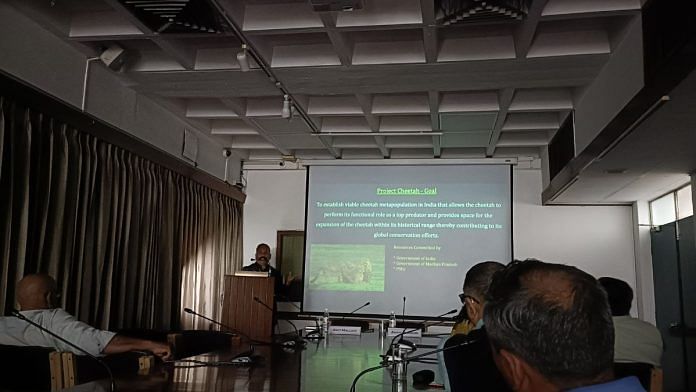New Delhi: In contrast to all the publicity the African cheetahs received when they arrived in India, a talk on the ambitious reintroduction project received a rather tepid response at New Delhi’s India International Centre. A year-and-a-half after the first cheetah was brought to India, and barely 10 days after the birth of five new cubs, the session ‘Whispers of Hope’—led by one of the frontrunners of the project—could only muster up a crowd of 20-25.
“This is not an academic or scientific perspective, this is very much a manager’s perspective on how we could pull off a project of this scale,” said Amit Mallick, Inspector General of the National Tiger Conservation Authority (NTCA), in the very beginning. He wanted to set the record straight on the 10 cheetah deaths.
What followed was a breakdown of the events of the past 18 months, which vividly detailed the developments since the inception of Project Cheetah.
The world’s first-ever transcontinental cheetah reintroduction initiative, it involved the translocation of South African and Namibian cheetahs to the Kuno National Park in Madhya Pradesh.
From the extinction of cheetahs in India in 1952 to the formal commencement of Project Cheetah in 2020, Mallick gave a “behind-the-scenes” look into the project and the government’s actions.
What’s the real story?
Amit Mallick was eager to clarify the circumstances that surrounded the deaths of 10 cheetahs in Kuno National Park. He emphasised that three out of the 10 mortalities included cubs who died due to extreme heat and dehydration – a condition officials now keep a strict lookout for.
Maggot infestation, kidney failure, and territorial fights, among other reasons, caused the death of the remaining cheetahs.
“You must keep in mind that not only were we doing this for the first time, we were the first people to be doing this too. We couldn’t anticipate certain deaths, no matter how prepared we were,” he said. Mallick was explicitly pointing to the maggot infestation-caused cheetah deaths that were falsely pinned on radio collars.
A project of this scale was bound to see some casualties, Mallick stressed. What’s more important, he said, is the tremendous dedication of the forest department and the Project Cheetah team in tracking and tending to the cheetahs released into the wild.
“It is no joke to bring an animal back from the wild, especially in a park that ranges over 700 sq km. We used radio signals and thermal tracking at 2 AM in the night sometimes,” Mallick said, congratulating the forest department and the Wildlife Institute of India team involved in the project.
Also read:
When can we see cheetahs?
When Mallick spoke about the present health of the cheetahs, the few attendees at the event perked up. He said that currently, there are 26 cheetahs in India, two of whom have been released into the wild. The rest are either in enclosures or quarantined inside Kuno National Park. Mallick also talked about the government’s plans to prepare MP’s Gandhisagar National Park as an alternative habitat for cheetahs once Kuno reaches its capacity.
But when can visitors finally catch a glimpse of the cheetahs at Kuno? Mallick refrained from revealing the exact date, choosing instead to emphasise on the importance of acclimatisation and the prevention of human imprinting on cheetahs.
The government’s current priority is the health of the animals. Even Prime Minister Narendra Modi will have to wait.
“The entire team is dedicated to Project Cheetah,” Mallick said. “In fact, PM Modi told us that no one, not even him, should be allowed to visit the cheetahs if it jeopardises their well-being
(Edited by Zoya Bhatti)



